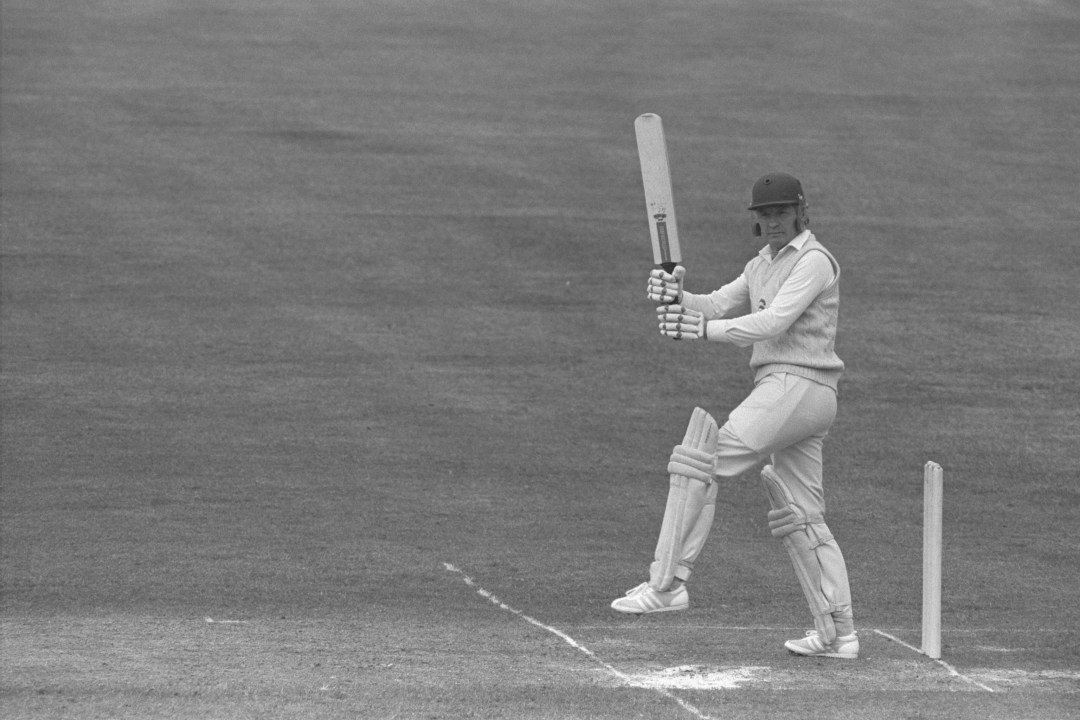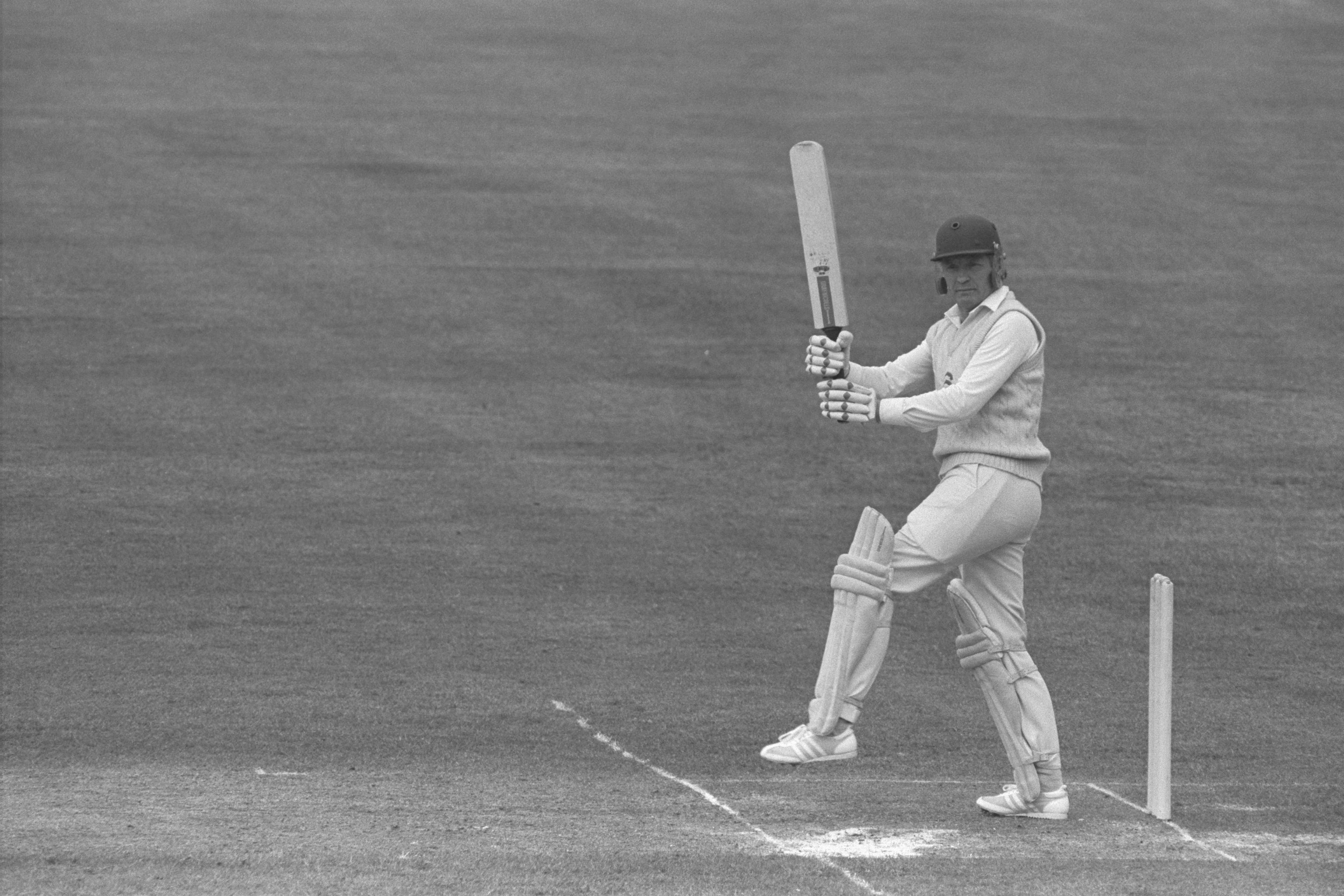Mike Denness, who died yesterday, could credibly claim to be the finest Scots-reared cricketer of the past 50 years. That is not, at least not quite, as small a claim as you may think.
Cricket in Scotland is a game of perseverance played on the edge of possibility. Even the most devoted flanneled-fool sometimes wonders if all the shivering and frustration is really worth it. In a nation scarcely over-freighted with sunshine of either the figurative or literal variety, cricketers cannot avoid being optimists. The climate and, it must be said, the culture is against them.
Few things vex the Scottish cricketer more than the accusation that there is something suspicious about being a cricketer in Scotland. There is a slice of Scotch opinion that views the game as some kind of colonial imposition and you can rely upon the chippier brand of nationalist* to complain there’s too much cricket on the television. Not content with disliking the game themselves they seem appalled that anyone else should like it.
This is narrow-minded nonsense, of course, and an ignorance based upon discreditable presumptions about race and class. To hear some people talk, you’d think cricket is a game whose appeal in Scotland is restricted to aristocratic Quislings. I must say that this would surely come as news to folk in bastions of “elitist” privilege such as Greenock, Stenhousemuir, Coatbridge or Paisley, to say nothing of Aberdeenshire or the Borders. Anyone who actually has any experience of cricket in Scotland knows that cricket is a classless game.
Which is not to say that Caledonia has failed to produce its share of classy players. Denness himself was an elegant batsman who in his very best moments was not extravagantly flattered by comparisons with Colin Cowdrey. If he had a weakness against the finest fast bowling that is one shared by most batsmen. Nevertheless, a test average a hair shy of 40 is not a record of under-achievement. Nor can you amass 25,000 first-class runs without some ability.
The Telegraph’s obituary errs, however, when it claims Denness was the fifth Scots-born cricketer to play a test for England. He was, in fact, the sixth and you can almost compile a complete XI of test cricketers born in Scotland. Eight have represented England while Tom Campbell, a light-hitting wicket-keeper, played five tests for South Africa before the First World War and Rutherglen’s Archie Jackson, greatest of Scottish and saddest of all Australian cricketers, needs no reintroduction and scarcely requires his story retold here.
Campbell, however, would not earn a place in an all-time Scottish XI. He would cede the gloves to Gregor MacGregor, for a time considered the finest stumper in England and a dual international to boot, representing Scotland on the rugby field and England in cricket.
If Jackson, not for nothing dubbed the Keats of cricket by no less an authority than David Frith, is inked to bat at three with Denness at four, Eric Russell (born in Dumbarton) will open the batting. If his test career brought only limited success, he nevertheless compiled more than 25,000 elegant runs for Middlesex.
Russell’s partner – and skipper of the side – would, of course, be Douglas Jardine of whom little need be said save that this supposed epitome of Englishness contained not a drop of English blood. Born in India to Scottish parents, Jardine may have been schooled in England but from the age of nine was based with his aunt in St Andrews. He came home in death too, his ashes being scattered in highland Perthshire.
On the bowling front, there is room for guarded optimism. David Larter (born in Inverness) would open. His 37 test wickets came at 25 runs apiece while a decade of toil for Northamptonshire earned 666 victims at a miserly 19 runs each.
Larter’s record, however, is meagre compared with that amassed by Scotland’s greatest wicket-taker. Over three decades Alex Kennedy (born in Edinburgh) took more than 2,800 wickets for Hampshire. Only five men have taken more first-class wickets and no-one will shove Kennedy further down that list. He only played a single test series in which he claimed 31 scalps on South African matting wickets ideally-suited to his medium-paced leg-cutters. He did the double five times and also took all ten wickets for the Players against the Gentlemen at the Oval in 1927.
Spin shall be provided by Peter Such (Helensburgh) and Ian Peebles (Aberdeen). Peebles was for a while the finest purveyor of leg-breaks in England, good enough to take more than 900 first-class wickets. In his rain-ruined first appearance against Australia he snared Bradman and McCabe; in his second he took 6 for 204 (from 71 overs) in a doomed cause as Australia won by an innings. At least he had the consolation of dismissing Woodfull, Ponsford and Kippax. Nae bad.
That leaves two places to be filled. Gavin Hamilton’s test career was as statistically notable as it was brief: one match, no runs, no wickets and no catches. Despite that he was a capable performer at the county level at least until a desperate case of the yips so wrecked his bowling that recovery proved impossible.
If Hamilton was perhaps fortunate to enjoy even a cup of coffee at the highest level, Dougie Brown could consider himself mildly unlucky that his appearances for England were confined to a handful of one day internationals. A bit more than just a bits-and-pieces cricketer his first-class record compares favourably with some – David Capel, for instance – who were granted the chance to be found wanting in the test arena.
Other Scots have made a mark in county cricket. Brian Hardie, for instance, was for years a dependable stalwart for Essex. But though he played only a handful of seasons in England, Jimmy Allan was for a long time considered the finest of Scottish all-rounders. A canny slow-left-armer, he made what Wisden deemed a “sensational” first-class debut for Oxford University against Yorkshire in 1953. His figures were 7-7-0-1 and five of the maidens were bowled to Len Hutton. He came close to the double for Oxford and Kent and, after a decade in Scotland, later returned south to play three successful seasons for Warwickshire.
Of other Tartan-reared cricketers, special mention should be made of two in particular. In the early 1920s Jack Hobbs offered the opinion that Greenock’s John Kerr was one of the finest opening bats in Britain. In 1921 he made 15, 60* and 147 in three innings against Warwick Armstrong’s dominant Australian touring side.
Like Kerr, the Reverend James Aitchison never played county cricket but he scored centuries against the visiting South Africans in 1947 and against the 1956 Australians, the latter said to have been considered by Keith Miller and Ray Lindwall the best innings made by an opponent that summer. Demonstrating his lack of familiarity with the hierarchy of the Church of Scotland, Worcester’s ebullient leg-spinner Roly Jenkins suggested that, bearing in mind the good fortune Aitchison had enjoyed against him, the good Reverend should be an Archbishop.
Of course, if the rules for selection that apply to international rugby or football are applied to cricket then an all-time fantasy Scotland XI takes on a very different hue. It would include Graeme and Peter Pollock whose father Andrew was born in Edinburgh (Shaun would be eligible for selection too). Tony and Ian Greig’s Scottish parentage provided their qualification for England while Bobby Simpson’s father played professional football for Stenhousemuir before emigration took him to Australia. There are, I am sure, many others (especially in the early decades of test cricket) of whom I am unaware.
But if we restrict selection to those born or reared in Scotland (plus Jardine) we arrive, I think, at a team that reads: Jardine*, Russell, Jackson, Denness, Brown, Hamilton, Kennedy, Allan, MacGregor+, Larter, Peebles. (12th Man, Such). Not, it is true, an XI to trouble history’s finest but not bad for an outpost on the edge of the cricketing world. Given the restrictions imposed by climate and geography it is not as weak a team as you might imagine. That said, it might be bested by a team selected from the ranks of test players who have been engaged as professionals by Scottish club sides since that XI would be able to draw on the talents of Wilfred Rhodes, Rohan Kanhai, Gordon Greenidge, Adbul Qadir, Mike Hussey, Kim Hughes, Chris Martin and many others.
*Fairness demands I note that plenty of Scottish nationalists nevertheless follow the game keenly and that many of them support England too.








Comments